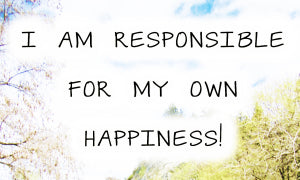Happiness via Self Forgiveness
A Guide to Happiness via Self Forgiveness

Do you ever kick yourself in the butt? No, not literally, but psychologically?
Have you done things in the past that you’re not so proud of? Perhaps it was hurting someone’s feelings or for being dishonest?
What about times when you were mean to yourself? Perhaps when failing to meet all the expectations set by your perfectionist self, you beat yourself up for it? Even just a little?
Where do you think all these thoughts go? Most likely, they stag like clutter in your inner space. The natural tendency is to repeat this in our head, until we eventually get sick of thinking about it and burry it deep in our subconscious. It is still in there nonetheless, keeping us away from being fully happy.
A Road to Happiness
Popular personal development strategies are known for using tools to achieve goals and techniques to become ‘successful’. If we drilled deep into these topics, you will find that they are all trying to lead you down the same path; the path to happiness. A happiness filled with fulfillment, purpose and peace.
While the tools and techniques I have gained from popular self-improvement channels were valuable, I felt as if something was missing. I’ve come to the understanding that the missing tool from my toolkit was forgiveness, particularly in forgiving myself. We tend to be our own toughest critics, which results in unnecessary self guilt plaguing our minds.
Since beginning to practice forgiveness regularly, I have noticed a shift in my mental attitude and gained a new sense of clarity. I feel better about myself. I feel genuinely happier.
I’ve added the self forgiveness practices as part of my ‘gratitude diet‘; a dedicated moment each week where I list out everything I am grateful for. Afterwards, I list everything I forgive myself for, from the previous week. I like to build my lists on paper. Once I’ve listed all items that I forgive myself for, I write freely; offering any additional thoughts I may have. The process is deeply rejuvenating and rewarding.
We are not always aware that we need to forgive ourselves. It almost becomes a subconscious roadblock, keeping us away from the things we are truly seeking; happiness.
Give yourself the gift of forgiveness. Create the time for yourself to release some of the mental burdens cluttering up in your inner space. Here are six areas you may want to consider as part of your ‘forgiveness diet’ and six practical exercisesfor each area.
1. Our Physical Body
Everyone I know, even the most physically attractive people, have at some point labeled themselves as ‘ugly’. There will always be at least one feature that they physically disliked about themselves. Too short, too tall, too bony, too fat, too skinny, short legs, big nose, small eyes, thinning hair, zits, etc.
- Forgiveness Exercise:Be thankful for each body part. Take a moment to imagine your life if you did not have that body part. Consider that there are people in more unfortunate situations than yourself. Imagine how difficult your life will be without it. I like to practice giving thanks to every part of my body for everything it provides me, for keeping me alive and giving me the opportunity to enjoy my wonderful life.
2. Our Intelligence and Learned Abilities
In of moments of frustration or under pressure, have you ever called yourself ‘stupid’? Maybe you haven’t, but I have. I am guilty of this. I have seen this most often with non-technical people dealing with technology. People tend to blame themselves and attribute a failure to their own intelligence. It sounds silly, yet it is so easy to fall into this trap.
- Forgiveness Exercise: Focus on your gifts. We are all gifted in our own unique ways. We all contribute to this world differently. Write out all things you are good at.
- If you are frustrated, recognize there may be other things contributing to your frustration:
- You are tired. Please take breaks. Rest.
- You are dehydrated. Drink water
- You are a newbie. See the progress you are making in learning something new. You are one step closer to mastering a new skill.
3. Our Productivity (or lack of activity)
Can you recall looking back at your day and realizing that you didn’t do anything productive? And then, you kicked yourself for it? Again, I am guilty of this. I have seen other people close to me do this, too. This guilt can serve as a form of motivation for some, but more often it just builds a debt of bad energy. I believe there are better ways to motivate ourselves.
- Forgiveness Exercise: Spend a few minutes in silence; close your eyes and focus on your breath. Take this moment to center yourself and reflect on what you learned today. I believe there are lessons to be learned in every moment of everyday. Seek and ye shall find. Even a seemingly unproductive day can carry valuable lessons.
- Create a plan each day for small achievable tasks towards a goal. Make sure to follow through on your plan of achievable and measurable mini-goals. It’s important to set realistic and clearly measurable goals. Set yourself up for success with small achievable tasks.
4. Bad Habits
We all have habits in our daily lives that we aren’t particularly proud of. Do you feel guilty each time you are reminded of some habit? This is self-imposed mental punishment. Not only does the punishment not feel good, but it also doesn’t help to rid ourselves of the habit. What are your habits? I constantly have to forgive myself for going to bed late and sleeping in; or getting lost for hours in my email inbox; or not getting physical exercise.
- Forgiveness Exercise:Forgive yourself for the bad habits. First, stop labeling them as bad habits. Call them habits you are working to replace with new habits. Work on one habit at a time. Create a weekly plan with achievable goals, and then follow through. Make the goals achievable.
- Dan Millman once said (paraphrasing from a seminar), “If you got up to do one jumping-jack each morning, that’s considered exercise. Do this everyday and you will form an exercise habit. The most important practice is to create the habit. Once you’ve established the routine, do two jumping-jacks. See? You’ve just doubled your exercise efficiency.” It’s a great way to look at replacing an old habit.
5. Keeping In Touch
I watched people beat themselves up for failing to keep in touch with friends and relatives. “What? He had a second baby? Oh gosh, I thought you were referring to his first baby. I better give him a call. I feel so guilty for not keeping in touch.” I sometimes feel so guilty for failing to call my mom and dad. I’d call them, but out of guilt rather than genuinely wanting to call. I would get so concerned withreleasing the guilt, that I’d miss the real point for calling in the first place. Can you relate?
- Forgiveness Exercise:List out all the people you’d like to keep in touch with. Schedule a time to connect with that old friend, or drop them a quick email to say hi. Before getting in touch, sit in silence for a few minutes and think about the qualities you admire about that person. Be present; connect with ourselves first before connecting with a loved one. Remember the purpose of connecting with them, to exchange and share the joys of your life; an opportunity to connect at the soul.
6. Our Health
A friend of mine was recently admitted to intensive care for a stress and dietary related health problem she developed while in college. She is only 27 and it is serious stuff. In our stress-prone & time-lacking culture, our health seems to be the most convenient thing to neglect. We only take it seriously when something bad happened, when the damage has already been done. We know what we need to do, but we don’t always follow through.
- Forgiveness Exercise: On a sheet of paper, draw a vertical line in the middle from top to bottom. On the left hand side, list out all the things you’ve done to neglect your health. Example, I’m sorry for depriving myself of sleep by staying up all night. I’m sorry for not giving myself fresh air today.
- On the right hand side, beside each item on the left side, list the opposite statement. As you are writing, feel the feelings of your words. If you wrote fantastic, imagine and feel fantastic. Example, I feel rejuvenated and energetic from a full night of sleep. I feel fantastic from the plenty of fresh air I got today from my walk outside.
- Create a plan on how you can make the sentences on the right hand side a reality.
Remember to be kind to ourselves. Forgiveness will help us love ourselves more, which gives us greater capacity to truly love others with openness and compassion.
Which of the above six areas did you connect most with? Any other thoughts that came to your mind? For me, I especially need to work on 3,4 and 6 (productivity, bad habits, health). Share your thoughts in the comments. See you there!
Editor’s note: This article is a special extended and modified edition of an article we’ve written and originally published on AlexShalman.

 Aloe Vera is more than just another pretty plant.
Aloe Vera is more than just another pretty plant.








